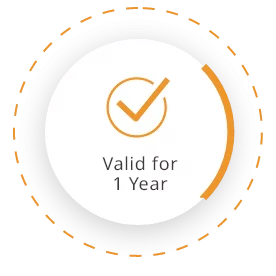Diploma in Cyber security (FSA)
Blended
Fee: ₹25,000
 Aman Kumar | Cyber Security Trainer
Aman Kumar | Cyber Security Trainer
This Diploma program provides a comprehensive foundation in cyber security and related technologies. Semester I covers cyber security basics, OSI/TCP-IP models, security layers, cyber threats, CIA triad, cybercrimes, and laws like IT Act 2000 and GDPR. It introduces programming concepts, algorithms, and languages, alongside cyber forensics, digital communication, network topologies, attacks (e.g., DDoS), and vulnerabilities. Students explore Windows/Linux OS, virtualization, web technologies, Python for hacking (using Scapy, Nmap), digital/financial literacy, and workplace safety. Semester II focuses on cyber security frameworks (NIST, ISO 27001), SOC operations, intrusion detection, malware analysis, and exploitation techniques. It includes SOC analyst skills (threat detection, incident triage), Blue Teaming, incident response, entrepreneurship, and communication/personality development, emphasizing leadership, planning, and life skills.
Objectives
The Diploma in Cybersecurity is designed to provide students with a strong foundation in information security principles, cyber threat detection, and hands-on skills in defending digital infrastructure. This program introduces learners to core security concepts, practical tools, ethical hacking methodologies, and modern cybersecurity frameworks necessary for securing both organizational and personal digital assets. The course balances theoretical understanding with real-world lab-based learning to make learners industry-ready. Following is the objective list:
To introduce fundamental concepts of cybersecurity, including threats, vulnerabilities, and risk management.
To provide hands-on experience with tools used for network scanning, log analysis, and malware detection.
To develop skills in ethical hacking, penetration testing, and cyber forensics.
To enable learners to identify and mitigate different types of cyber attacks.
To build awareness about cybersecurity laws, privacy concerns, and best practices.
To prepare students for entry-level roles such as SOC Analyst, Cybersecurity Technician, or Ethical Hacker.
What Will You Learn
By the end of this diploma program, you will gain a thorough understanding of how cyber threats work and how to defend against them using both manual and automated techniques. You will learn to work with Linux-based systems, use Python for scripting security tasks, configure firewalls, and set up testing environments using virtual machines. The course also covers threat intelligence, security operations, and common attack vectors like phishing, brute-force, and DDoS attacks. With a strong focus on hands-on labs, this course will equip you with the skills required to analyze, detect, and respond to security incidents in real-world environments.
Skills you will gain
Prepare for your career path
Protects networks from cyber threats and monitors for suspicious activity., Monitors and analyzes security events in real time using SOC tools., Performs authorized hacking to find vulnerabilities in systems., Recovers and analyzes digital evidence in cybercrime cases., Analyzes malicious software to create defense mechanisms., Advises organizations on securing IT infrastructure and compliance., Builds and secures enterprise networks., Finds and reports security bugs in live applications for rewards.
Key Skills to Learn
Networking, SIEM, Threat Hunting, Python, SIEM Tools, Incident Response, Logs, Linux, Kali Linux, Metasploit, Burp Suite, Python, Autopsy, FTK, File Recovery, Evidence Chain, Ghidra, IDA Pro, C/C++, Sandboxing, Risk Assessment, Compliance, ISO, Client Handling, Cisco, Firewalls, IDS/IPS, TCP/IP, Burp Suite, Recon Tools, Reporting, OWASP
SOC analyst A SOC Analyst is the front-line defender in any cybersecurity team. Their main role is to monitor and analyze activity on networks, servers, endpoints, and databases to identify potential threats or suspicious behavior. SOC Analysts respond to incidents, investigate them, and help strengthen the security infrastructure to prevent future attacks.
Key Skills to Learn
Networking basics, Operating systems, Security tool, Log analysis, Incident handling Threat intelligence
Penetration tester A Penetration Tester (also called an Ethical Hacker) is a cybersecurity expert who simulates real-world cyberattacks on systems, networks, and applications — with legal permission — to identify vulnerabilities that could be exploited by malicious hackers. The goal is to strengthen an organization's security posture by proactively discovering and reporting security flaws before attackers do. Pentesters think like hackers but act ethically to help companies fix security gaps. They work with red teams, security consultants, or independently through bug bounty programs.
Key Skills to Learn
Networking & Protocols, Operating Systems (Linux & Windows), Web Application Security (OWASP Top 10), Penetration Testing Tools (Nmap, Burp Suite, Metasploit, Wireshark), Vulnerability Scanning (Nessus, OpenVAS), Scripting (Python, Bash, PowerShell), Report Writing & Documentation
Jobs in India

1.5L+
Average Salary

4–7 LPA
Job Growth

30.00%
Learn from the industry experts and stay ahead of the curve



 and many more
and many more
Curriculum
-
Introduction to Cyber Security & Computer Programming
-
 Introduction to cyber security
Introduction to cyber security
-
 Why Cyber Security is Important?
Why Cyber Security is Important?
-
 Role of Cyber Security Engineer
Role of Cyber Security Engineer
-
 CIA Triad
CIA Triad
-
 OSI Layer
OSI Layer
-
 The hacking methodology
The hacking methodology
-
 Type of Threat Actors and Attack vectors
Type of Threat Actors and Attack vectors
-
 Governance, Risk & Compliance
Governance, Risk & Compliance
-
 Introduction to Indian Cyber Law
Introduction to Indian Cyber Law
-
 Introduction to NIST Framework
Introduction to NIST Framework
-
 Using NIST Framework
Using NIST Framework
-
 Computer Forensics investigation process
Computer Forensics investigation process
-
 Introduction to Windows Forensics
Introduction to Windows Forensics
-
 Lab: Analyzing Malware using Volatility
Lab: Analyzing Malware using Volatility
-
 Data Acquisition & Duplication
Data Acquisition & Duplication
-
SLM - Introduction to Cyber Security & Computer Programming
-
-
Digital Communication & Computer Networks
-
 Introduction to Networks and Reference Models
Introduction to Networks and Reference Models
-
 OSI layers
OSI layers
-
 Network Protocol
Network Protocol
-
 IP Address and Subnet Classes
IP Address and Subnet Classes
-
 Network Devices
Network Devices
-
 Introduction to network attack
Introduction to network attack
-
 ARP poisoning
ARP poisoning
-
 ARP Poisoning with AR spoof & Ettercap
ARP Poisoning with AR spoof & Ettercap
-
 DNS spoofing
DNS spoofing
-
 Introduction to Sniffing
Introduction to Sniffing
-
 Sniffing tools & Countermeasures
Sniffing tools & Countermeasures
-
SLM - Digital Communication & Computer Networks
-
-
Fundamentals of Windows and Linux OS
-
 Overview of Operating System
Overview of Operating System
-
 Working with Linux
Working with Linux
-
 Linux Command Line Structure
Linux Command Line Structure
-
 Sample Command Application
Sample Command Application
-
 Linux Directory Structure
Linux Directory Structure
-
 Flavours of Linux OS
Flavours of Linux OS
-
 Linux File System & Directories
Linux File System & Directories
-
 Introduction to Kali Linux
Introduction to Kali Linux
-
 Installing Kali Linux in Virtual Box
Installing Kali Linux in Virtual Box
-
 Managing Users & Groups
Managing Users & Groups
-
 Managing SSH in Kali Linux
Managing SSH in Kali Linux
-
SLM - Fundamentals of Windows and Linux OS
-
-
Python Programming for Cyber Security
-
 Introduction to Python
Introduction to Python
-
 Python Execution and Installation
Python Execution and Installation
-
 Identifiers, Variables and Datatypes
Identifiers, Variables and Datatypes
-
 Operators
Operators
-
 Python-Flow Controls
Python-Flow Controls
-
 Functions
Functions
-
 Python Classes
Python Classes
-
 Inheritance, Files
Inheritance, Files
-
 Python - File Handling, API programming
Python - File Handling, API programming
-
 Python - Important Modules
Python - Important Modules
-
 Project 1 - Port Scanner
Project 1 - Port Scanner
-
 Project 2 - Keylogger
Project 2 - Keylogger
-
SLM - Python Programming for Cyber Security
-
-
SSC/N0925 QP_IT_Penetration Tester
-
 Malicious Codes and Terminologies
Malicious Codes and Terminologies
-
 Cyber security Breaches
Cyber security Breaches
-
 Penetration Testing and Methodologies
Penetration Testing and Methodologies
-
 Frameworks and Standards for Cyber Security
Frameworks and Standards for Cyber Security
-
 Hardware and Software Elements of Computer Systems
Hardware and Software Elements of Computer Systems
-
 Understanding Terminologies
Understanding Terminologies
-
 Vulnerability & Pen testing
Vulnerability & Pen testing
-
 Cyber Security Controls
Cyber Security Controls
-
 Cyber Security Policies
Cyber Security Policies
-
 CVE & CVSS
CVE & CVSS
-
SLM - SSC/N0925 QP_IT_Penetration Tester
-
-
Security basics
-
 Attacks & Threats
Attacks & Threats
-
 Architecture & Design
Architecture & Design
-
 Implementation
Implementation
-
 Operation & Incident response
Operation & Incident response
-
 Governance,risk & compliance
Governance,risk & compliance
-
 Firewalls
Firewalls
-
 Encryption
Encryption
-
 Biometrics
Biometrics
-
 Antivirus
Antivirus
-
 Password Management
Password Management
-
SLM - Security basics
-
-
Blue teaming & Cyber SOC
-
 Incident management process
Incident management process
-
 System logs
System logs
-
 Lifecycle of an event
Lifecycle of an event
-
 Incident response team & benefits
Incident response team & benefits
-
 Incident response plan
Incident response plan
-
 Prevention, Detection & Investigation through LogsPage
Prevention, Detection & Investigation through LogsPage
-
SLM - Blue teaming & Cyber SOC
-
-
Live Classes
-
Final Assessment
Instructor

Aman Kumar
Cyber Security Trainerwith over 4 years of teaching experience, dedicated to empowering the next generation of digital defenders. As a Certified Ethical Hacker (CEH), Aman brings a wealth of practical knowledge to the classroom, honed through his hands-on experience as a former intern at the Cyber Cell, where he tackled real-world cyber threats. His expertise extends to the field of bug hunting, where he has successfully identified and mitigated vulnerabilities, earning recognition as a skilled bug hunter in the cyber security community.
Shareable Certificate

Other Details
Diploma in Cyber Security (FSA)
 Credentials
Credentials Get Job Assurance and JumpStart your career in Cyber Security





FAQs
-
What is the duration of the Cybersecurity Diploma course?
The course runs for 1 year (48 weeks) and includes approximately 96 lectures.
-
Do I need any technical background to join this course?
No prior technical background is required. This course is designed for beginners and starts from the fundamentals of cybersecurity and computer systems.
-
Will I receive a certificate after completing the course?
Yes, after successfully completing the course and passing the assessments, you will receive a Diploma Certificate in Cybersecurity.
-
Will this course include hands-on practicals ?
Yes! The course includes lab sessions, hands-on practicals, and real-world simulations to help you apply what you learn.
-
Is this course suitable for students from non-IT backgrounds?
Absolutely. The course starts from scratch, so students from any stream (science, commerce, arts) can join and benefit.
Learner's Ratings
Are you happy to learn with us?
You must be logged in to write a review.
Reviews
No reviews yet.
Associated Courses
 Instructor:
Instructor:
 Duration:
Duration:
 Lectures:
Lectures:
 Course Credit:
Course Credit:
 Certification Body:
Certification Body:
 Project:
Project:
 Language:
Language:
 Access:
Access:
 Downloadable Resources:
Downloadable Resources:
 Shareable Certificate:
Shareable Certificate:

